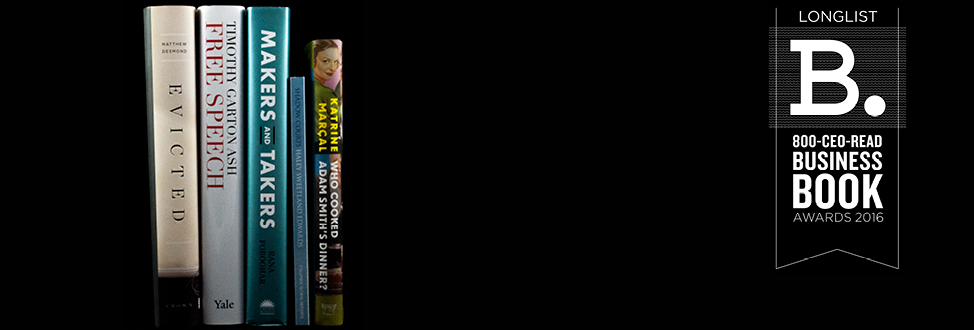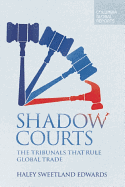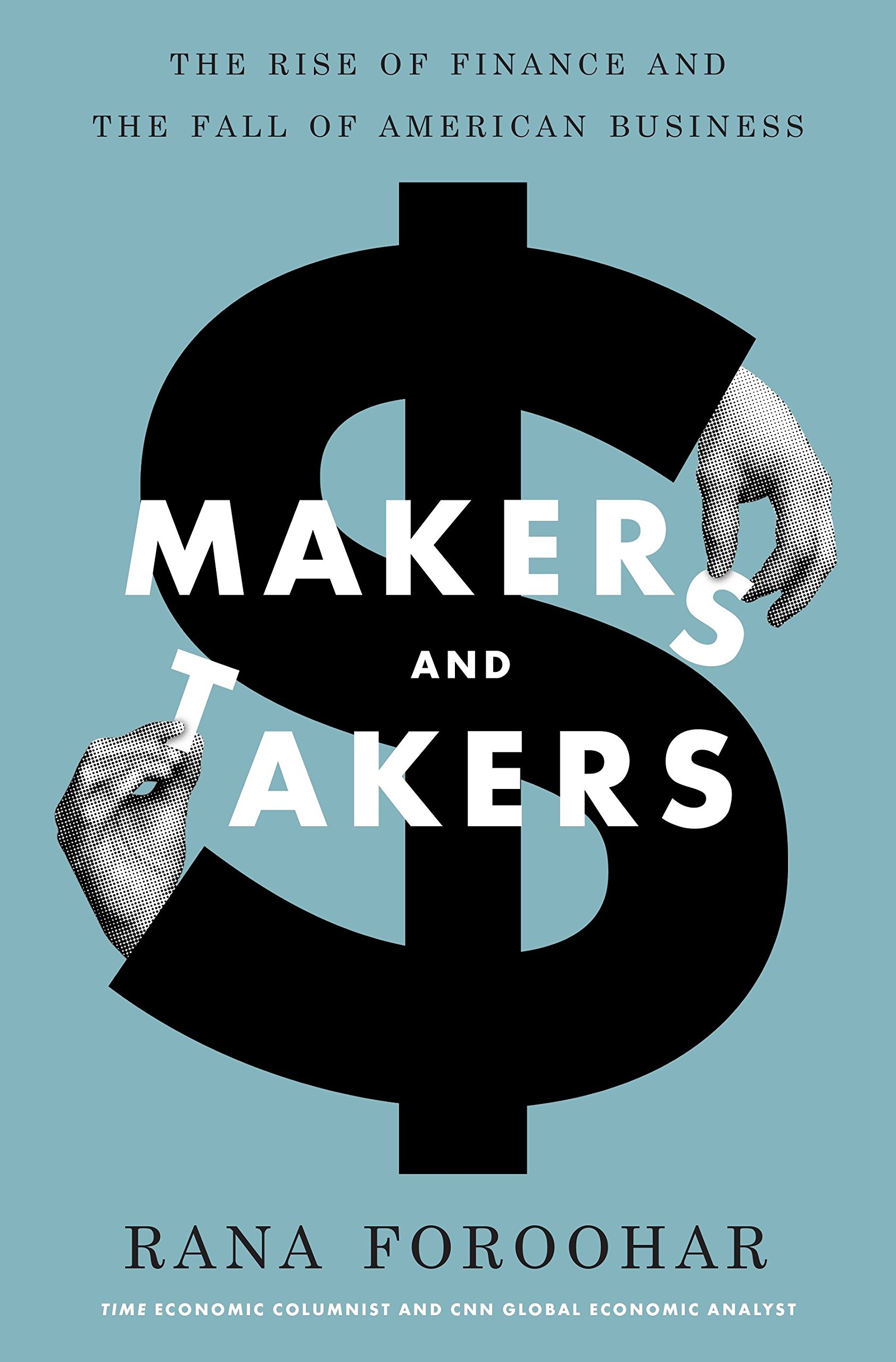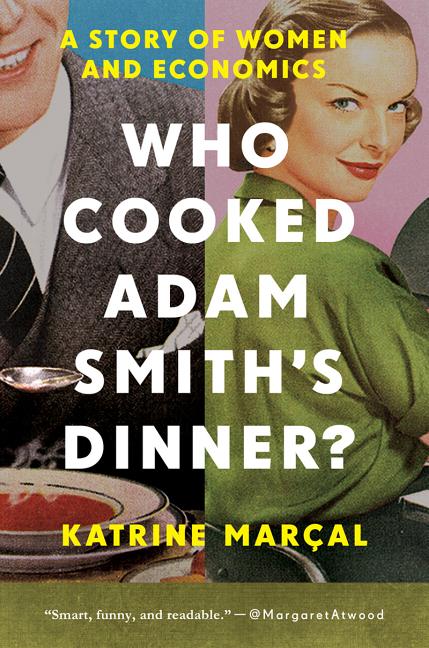Inside the Longlist: Current Events & Public Affairs
December 07, 2016
The reality underlying each of our choices for the best Current Events & Public Affairs book of the year is that good business practices can be a balm to society, while bad business practices act as a barrier to progress.
The Current Events and Public Affairs category is a new one for us this year. We've always felt that books in this space deserved a place in the business book conversation. After all, what's in the news or the political crosswinds can have profound effects on our businesses, and it is important to keep abreast of these topics and consider what affect they may have if we want to remain in business. This year brought that reality into sharper focus than ever, as we had populist uprisings within both major political parties in 2016, shifting the tenor of the debate about a wide range of economic issues, with one ultimately wresting control of a major American political party and winning the presidential election. And, of course, elections have consequences. Health care, taxes, worker protections, and trade agreements all hang in the balance. The books we’ve chosen speak to these issues, in both broadly political and profoundly personal ways. And all of them have business implications—and, possibly, solutions.

 Matthew Desmond’s fourth book is a powerful exposé of the real estate industry in the inner city, focusing on one critically important and, until now, largely overlooked issue: eviction. Evicted: Poverty and Profit in the American City is a deep and devastating examination of the lives on the front lines of this economic reality—both the tenants being evicted, and the landlords evicting them. Winding its way through the courts, sheriffs department, social services, and even moving companies involved in the process, it contains a thick description of people clinging to “the margins of society” in an American city (our home city of Milwaukee), desperately trying not to fall off. Desmond's book is storytelling at its finest, if most bleak, showing us with learned precision and clarity how eviction is not just a result or condition of poverty, but one of its primary causes.
Matthew Desmond’s fourth book is a powerful exposé of the real estate industry in the inner city, focusing on one critically important and, until now, largely overlooked issue: eviction. Evicted: Poverty and Profit in the American City is a deep and devastating examination of the lives on the front lines of this economic reality—both the tenants being evicted, and the landlords evicting them. Winding its way through the courts, sheriffs department, social services, and even moving companies involved in the process, it contains a thick description of people clinging to “the margins of society” in an American city (our home city of Milwaukee), desperately trying not to fall off. Desmond's book is storytelling at its finest, if most bleak, showing us with learned precision and clarity how eviction is not just a result or condition of poverty, but one of its primary causes.
 We could have filled this entire list with thick academic tomes that act as well as doorstops as they do an enlightening dissertations on their topic of choice. Alas, as educational and immersive as they are, it’s hard to recommend such hefty academic books to a busy business audience. But there was one such book, Timothy Garton Ash’s Free Speech: Ten Principles for a Connected World, that we felt spoke to the moment so powerfully that we couldn’t leave it off. It is a powerful and insightful examination of the nature of speech, the history of our right to free speech in America, and the how the creation of the internet as an American invention has embodied those values at its core, even if they are unequally distributed throughout the world wide web. Touching also on the nature of a robust and free press, and what journalism even is in an age when we all have a digital megaphone in our pockets, I’m hoping decision makers in congress, and in companies like Facebook and Twitter find their way to this book.
We could have filled this entire list with thick academic tomes that act as well as doorstops as they do an enlightening dissertations on their topic of choice. Alas, as educational and immersive as they are, it’s hard to recommend such hefty academic books to a busy business audience. But there was one such book, Timothy Garton Ash’s Free Speech: Ten Principles for a Connected World, that we felt spoke to the moment so powerfully that we couldn’t leave it off. It is a powerful and insightful examination of the nature of speech, the history of our right to free speech in America, and the how the creation of the internet as an American invention has embodied those values at its core, even if they are unequally distributed throughout the world wide web. Touching also on the nature of a robust and free press, and what journalism even is in an age when we all have a digital megaphone in our pockets, I’m hoping decision makers in congress, and in companies like Facebook and Twitter find their way to this book.
 International trade agreements were a hot button issue in this year’s presidential election. They are one most complex, and—because of the job loss popularly associated with them—were one of the most emotional issues of the year. As a consequence of that dichotomy, it is one of the issues that gets dumbed down the most. In Shadow Courts: The Tribunals that Rule Global Trade, Haley Sweetland Edwards eschews populist appeals, opting instead for a deep exploration of on one peculiar, arcane aspects of those agreements: Investor-State Dispute Settlement provisions. Most people have never heard of ISDS clauses. Sweetland Edwards does a quick (just over 100 pages) and thorough job of remedying that.
International trade agreements were a hot button issue in this year’s presidential election. They are one most complex, and—because of the job loss popularly associated with them—were one of the most emotional issues of the year. As a consequence of that dichotomy, it is one of the issues that gets dumbed down the most. In Shadow Courts: The Tribunals that Rule Global Trade, Haley Sweetland Edwards eschews populist appeals, opting instead for a deep exploration of on one peculiar, arcane aspects of those agreements: Investor-State Dispute Settlement provisions. Most people have never heard of ISDS clauses. Sweetland Edwards does a quick (just over 100 pages) and thorough job of remedying that.
 The traditional role of finance throughout human civilization has been to make value more fungible and markets more liquid. In Makers and Takers: The Rise of Finance and the Fall of American Business, Rana Foroohar makes a powerful argument that the financialization of our economy long ago reached a point where it was doing more damage than good. You’ll learn how American businesses have become more adept at balance sheet engineering than real innovation, and how financial centers are pulling our best minds to build an algorithmic house of cards that benefits those in the upper echelons of finance and corporate America in the short term, but destroy jobs and stifles new job creation, increasing economic inequality and undermining economic stability in the long term.
The traditional role of finance throughout human civilization has been to make value more fungible and markets more liquid. In Makers and Takers: The Rise of Finance and the Fall of American Business, Rana Foroohar makes a powerful argument that the financialization of our economy long ago reached a point where it was doing more damage than good. You’ll learn how American businesses have become more adept at balance sheet engineering than real innovation, and how financial centers are pulling our best minds to build an algorithmic house of cards that benefits those in the upper echelons of finance and corporate America in the short term, but destroy jobs and stifles new job creation, increasing economic inequality and undermining economic stability in the long term.
 While Adam Smith was forming his ideas about economics, which still act as the underpinnings of “the dismal science,” he failed to take into account half the labor force. And that is because half of it went unpaid, doing the domestic work that acted as an economic underpinning of its own—without whose labor the rest of the economy would come to a grinding halt. It was the work of women like Adam Smith’s mother, who as a lifelong bachelor, he lived with most of his life. Unlike the pin factory, Smith never questioned where his dinner came from, because it was just there, on the table every evening. In Who Cooked Adam Smith's Dinner?: A Story of Women and Economics, Katrine Marçal critiques the entire history of economics from a feminist perspective, taking the cold, supposedly rational, self-interested model of “economic man” off its pedestal and exposing it for the myth that it is. In the process, she offers a more realistic and holisitc view of the economic activity and history, and a way forward.
While Adam Smith was forming his ideas about economics, which still act as the underpinnings of “the dismal science,” he failed to take into account half the labor force. And that is because half of it went unpaid, doing the domestic work that acted as an economic underpinning of its own—without whose labor the rest of the economy would come to a grinding halt. It was the work of women like Adam Smith’s mother, who as a lifelong bachelor, he lived with most of his life. Unlike the pin factory, Smith never questioned where his dinner came from, because it was just there, on the table every evening. In Who Cooked Adam Smith's Dinner?: A Story of Women and Economics, Katrine Marçal critiques the entire history of economics from a feminist perspective, taking the cold, supposedly rational, self-interested model of “economic man” off its pedestal and exposing it for the myth that it is. In the process, she offers a more realistic and holisitc view of the economic activity and history, and a way forward.





